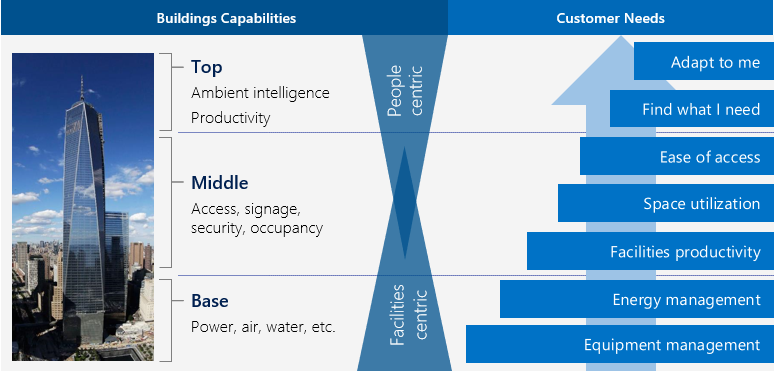What if a building could proactively identify inefficiencies, reduce consumption and deliver personalized comfort? Keeping the complexity in mind of managing a building on different levels, these futuristic ideas still seem a long way off. However, with today’s technology, they are well within reach.
Defining a building
To create a smart building, you first need to define and identify the capabilities of a building and the customer needs for that building.
The diagram below (created by Microsoft) shows an excellent definition of a (smart) building, where you have a clear distinction between people and facilities focus.

Enabling the Smart Building
The idea and setup of a smart building is nothing new. We’ve been equipping our buildings and homes with “smart” elements for decades. Such as motion-activated lighting, programmable heating systems and alarm systems.
Today, a smart building is one that combines a traditional connected building with the power and scale of the cloud.
Once that first step is taken to connect your building to the cloud with smart devices and sensors, it allows you to have better visibility, greater efficiency and control through insights from the building telemetry data through data analysis.
Building services and solutions on building data and analytics enables people to interact with the building. However doesn’t this only create a responsive building rather than a smart building?
Fundamentally, the benefits of a smart building solution lies in the gained insights and visibility. These can be divided in 4 key areas:
- Efficient Operations
Operators can prevent faults before they happen by enabling real-time insights into the buildings assets. This is done by eliminating the unknown with predictive maintenance. - Optimized Resources
One of the biggest costs for a building is the resource consumption. A smart building can drive efficiency initiatives through automation and machine learning. - Space Utilization
Through insights into the space utilization, a smart building can drive innovation into space usage and drive/improve renovation and expansion plans. - Occupant Satisfaction
Deliver personalized comfort, enhance collaboration and empower occupants to focus on their core competencies.
Creating the Smart Building
No matter the size of the building, there is always a benefit from getting more insights into the operations: resource consumption and utilization of the building.
Like any other IoT project, it’s a matter of connecting your devices and sensors to the cloud and allowing aggregation of data to gain visibility and insights. Armed with these insights you can improve business processes and allow interaction with the building itself.
Microsoft recently launched Azure Digital Twins, a platform that accelerates the creation of a smart and connected building. With Azure Digital Twins you can virtually replicate the physical world by modeling relationships between people, places and devices in a spatial intelligence graph.
As Sam explained in his blogpost, Codit is already working in the smart building space.
We are working on empowering people and buildings to closely interact and gain deeper insights into the buildings performance. What Azure Digital Twins allows us to do, is to customize our IoT solutions across many different types of customers, whether it’s smart buildings, or smart factories, at scale.
Conclusion
The real value of Smart buildings is by making the data the building produces intelligible and creating insights on top of that, eventually bringing those insights back to the the business to optimize processes and interactions.
A smart building allows owners to have better visibility into the building’s health, operators to be more proactive and define more efficient processes. While the occupants benefit from engaging spaces, exceptional comfort and have more productive experiences.
Cheers,
Glenn
Take a look at a smart building project we are working on with EMPA – Nest

Subscribe to our RSS feed